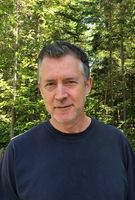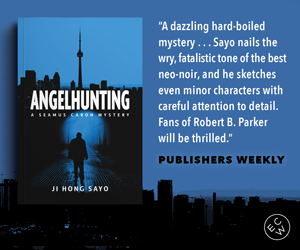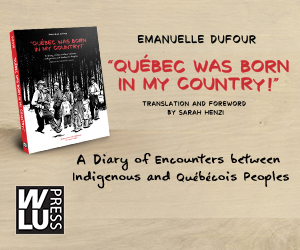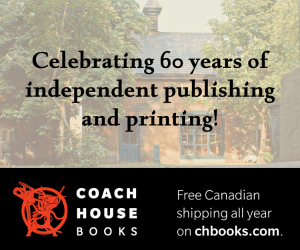Ross Breithaupt on Weaving Together Music, Mourning, and the Gritty Reality of Tree Planting in His Moving First Novel
Anyone who's ever tried their hand at tree-planting in Canada knows it's an intense undertaking. For 20-year old Rory Fleck, the intensity is just what he's looking for—a place to forget himself and bury his grief at his brother's death along with the new life he's planting.
We meet Rory in Ross Breithaupt's Midland (Porcupine's Quill, available for pre-order now) as he labours among the blackflies in the rugged terrain of Northern Ontario. There he forges new relationships and compiles mixed tapes and letters to his late brother. Gritty and packed with a cast of unforgettable characters, Midland is a coming of age story, a story of healing, and an absorbing, powerful tale from a new voice in fiction.
We're excited to welcome Ross to Open Book to talk about Midland as part of our Long Story series for novelists. He tells us about what he learned from writing this book (a helpful list for emerging writers!), about the long-buried tragedy that sparked the story to life, and about the Finnish grandmother who became one of his favourite characters.
Open Book:
Do you remember how your first started this novel or the very first bit of writing you did for it?
Ross Breithaupt:
The seeds for Midland were sown decades ago when I was twelve years old, when my mother told me that a young man from our church had killed himself. My initial reaction was not the sadness or confusion that you might expect, but a kind of fascination—especially when Mom told me that he had always seemed a charming and happy fellow, and that he’d held the door for her at church just the Sunday before. The thing is we never talked about that young man again, nor was the family ever mentioned in the community prayers at our church.
During my teens I was sometimes haunted by this event, but only rarely after that. Then, ten years ago, I took a leave from teaching to undergo major surgery, and I found myself coming around to that family again. I imagined a much younger brother – I called him Rory – whose family has protected him from the truth of his brother’s death such that he’s never had to grapple with it. I had a clear image of him in an orange tent, writing a letter by flashlight to his long-dead brother. That’s when I knew I had to tell Rory’s story.
OB:
How did you choose the setting of your novel? What connection, if any, did you have to the setting when you began writing?
RB:
I chose to place Rory’s tent, and to set my story, in a tree planting camp in Northern Ontario. Having been a planter myself for one season (in the late 80s), I felt that the long workdays and harsh conditions—the slash and burn clear-cut blocks, the weather extremes, and the outrageous blackflies—would provide the perfect backdrop for Rory’s slow journey towards some kind of long-overdue mourning.
OB:
Did you find yourself having a "favourite" amongst your characters? If so, who was it and why?
RB:
Apart from my protagonist, Rory, my favourite character would have to be Hilda, Rory’s grandmother, whom he calls Mummu (Finnish for grandmother). Mummu plays the archetypal role of “mentor” in Midland. Her story is nested within the main narrative. Much of it takes place in her beloved sauna. She lives in Thunder Bay, Ontario—the sauna capital of the world outside of Finland. She has worked through her husband Jakob’s death, years and years before, and is now just coming around to “talking” to him again. After a bad fall in the sauna, she rallies and gathers enough strength to meet with Rory, who is on a day off from tree planting. In her unconventional way – with the aid of poetry and song – she challenges Rory to face his fears and finally grieve for his lost brother.
Your CanLit News
Subscribe to Open Book’s newsletter to get local book events, literary content, writing tips, and more in your inbox
OB:
Did you do any specific research for this novel? Tell us a bit about that process.
RB:
I read a few books exploring suicide and its effects on the family, the most influential of which, for me, was History of a Suicide: My Sister’s Unfinished Life by Jill Bialosky. Bialosky describes suicide as an attack on the family – an “attack from within”. Rory’s family is attacked in this way by the elder son Mike, and there is a retreat to Midland, Ontario. There, through his teenage years, Rory is insulated from the truth. But after a horrible car accident, memories of Mike are triggered and Rory finds himself in a kind of living purgatory – a “mid-land” if you will. I researched the concept of the Bardo in The Tibetan Book of the Dead. The Bardo is a transition state – neither here nor there. In thinking about what challenges Rory might face, and what characters he might encounter on his journey through his own Bardo, I consulted two other books: On Death and Dying by Elisabeth Kubler-Ross, and the children’s book Paddle-to-the-Sea by Holling C. Holling.
OB:
What, if anything did you learn from writing this novel?
RB:
Midland is my first novel, so I learned a great many things. Here are some of them, in no particular order:
- Less is, in fact, usually more. I’d invented a song called “The Ballad of Uncle Verne” (about Rory’s great uncle who was killed in a mining disaster), and I had Rory’s mother, Anni, sing it at one of the Fleck family get-togethers. It was several verses long and I was ever so proud of it, but, in the end, it didn’t serve the story in any significant way. So, I killed it!
- Song lyrics are a no-no. Using song lyrics without permission is copyright infringement. My editor Stephanie Small made sure that I fathomed this. In my story, Rory makes a mixtape for Mike and the music ends up being a large part of the healing process. In the first draft that Stephanie read, I’d probably quoted lyrics from twenty songs. I learned to enhance my descriptions of the songs – the emotion in a guitar riff, perhaps, or the richness of a melody, or the rhythm of the drums – rather than relying on the lyrics to tell the tale.
- An epistolary novel can get claustrophobic fast. Initially, every chapter of my book was in the form of a letter written by Rory. I got some excellent, early advice to include chapters from other characters’ perspectives. This made for a more interesting read and improved the pacing of the story.
- Be patient. The road to a publishable manuscript is long and winding and foggy. Stay the course.
_______________________________________________
After experiencing one season as a tree planter in Northern Ontario, Ross Breithaupt was a middle school teacher in suburban Toronto for twenty-two years. He has since spent his time writing his debut novel, Midland, as well as a series of essays for the Globe and Mail. He lives in Toronto.




